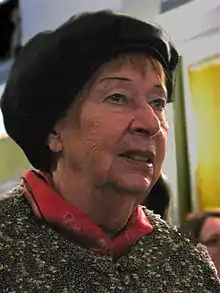Irena Kwiatkowska
Irena Kwiatkowska (17 September 1912 – 3 March 2011)[1] was a popular Polish actress, known in Poland for her many cabaret roles and monologues, as well as appearances in (mostly comedy) movies and television shows.
Irena Kwiatkowska | |
|---|---|
 Kwiatkowska in 2008 | |
| Born | 17 September 1912 |
| Died | 3 March 2011 (aged 98) |
| Occupation | Actress |
| Years active | 1935–2009 |
| Spouse(s) | Bolesław Kielski (1947–1994) |
Life
Kwiatkowska graduated from the Państwowy Instytut Sztuki Teatralnej (National Theatrical Arts Institute) in 1935. Until the outbreak of World War II, she appeared in the Teatr Powszechny in Warsaw, Teatr Nowy in Poznań, Teatr Polski in Katowice, and in Wilno. During the War, she fought in the Armia Krajowa and participated in the Warsaw Uprising.[2]
Kwiatkowska's first appearance after the War was in the Siedem Kotów (Seven Cats) cabaret in Kraków, where the renowned Polish poet, Konstanty Ildefons Gałczyński, authored a number of roles for her. Gałczyński allegedly created the prominent character of Hermenegilda Kociubińska with Kwiatkowska in mind. In 1948 she came back to Warsaw, appearing in the Teatr Syrena and, now-legendary, Dudek and Szpak cabarets. She was also a prominent member of the cast in the famous televised Kabaret Starszych Panów.
Kwiatkowska's other famous television roles included the cult series, Wojna Domowa (1965–66) and Czterdziestolatek ("Being Forty", 1974–77). In the Czterdziestolatek series, she portrayed the memorable "Kobieta Pracująca" ("Working Woman"), a recurring character who performs various unusual or absurd jobs. She is best remembered for this role, and the character's name has become synonymous with Kwiatkowska. She reprised the role in the series sequel, Czterdziestolatek 20 lat później (1993). She also appeared in many theatrical movies, mostly in comedies and musicals, including memorable cameos in later years. Her résumé included frequent voice acting on the radio.
During her lifetime Kwiatkowska received numerous awards, including the Wielki Splendor Polish Radio Theatre Award (1993) and the Superwiktor (2002), a special lifetime achievement award for outstanding television personalities. Her 90th birthday celebration in 2002 was a major cultural event which attracted a varied array of artists on stage during a special televised show. She performed with the Teatr Polski in Warsaw, where she continued to appear in an interpretation of Gałczyński's Zielona Gęś. She appeared in Niarnia in 2009. She died in Skolimów on 3 March 2011.[2]
Filmography
| Year | Title | Role | Notes |
|---|---|---|---|
| 1953 | A Matter to Settle | Train Passenger | |
| 1958 | Zolnierz królowej Madagaskaru | Aniela Lemiecka | |
| 1960 | Tysiac talarów | Eulalia Wydech | |
| 1961 | Drugi czlowiek | Gorzycka | |
| 1962 | I ty zostaniesz Indianinem | Redactor of 'Kobieta aniol' | |
| 1963 | Klub kawalerów | swatka Pelagia Dziurdziulinska | |
| 1963 | Zacne grzechy | Firlejowa | |
| 1971 | Dzieciol | Nurse | |
| 1976 | Motylem jestem, czyli romans czterdziestolatka | Working Woman | |
| 1978 | Hallo Szpicbródka, czyli ostatni wystep króla kasiarzy | Buffet Attendant Makowska | |
| 1979 | Prosze slonia | Mama | Voice |
| 1984 | Lata dwudzieste, lata trzydzieste | Aniela | |
| 1988 | Pan Kleks w kosmosie | Crystal ball 'Kula informacyjna' | Uncredited |
| 1991 | Controlled Conversations | Aunt Lusia | |
| 2000 | Når nettene blir lange | Uncredited | |
| 2008 | Jeszcze nie wieczór | Irena Kwiatkowska | |
| 2020 | Kill It and Leave This Town | Old Woman on the Train | Voice, (final film role) |
See also
Notes
- "Irena Kwiatkowska: Star takes final bow". thenews.pl. Retrieved 3 March 2011.
- Harris M. Lentz III (3 May 2012). Obituaries in the Performing Arts, 2011. McFarland. pp. 191–. ISBN 978-0-7864-6994-9.
External links
- "Irena Kwiatkowska". WIEM, darmowa encyklopedia (in Polish). Onet.pl. Retrieved 29 August 2006.
- Irena Kwiatkowska at IMDb